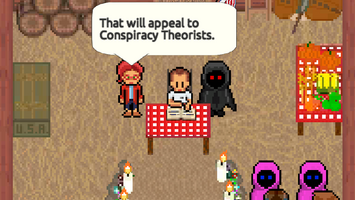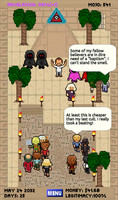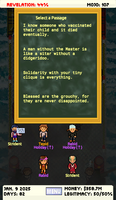Two Friends — One Game — Zero Experience



***This was originally posted on Medium shortly after we released our game on Google Play. I recently took the game down from there because keeping up with Google's policies became too onerous. Someone on reddit suggested publishing the game here, so I thought I'd also add this post for anyone who may find it useful ~ Michael ***
It’s so long ago now that I can’t even name a date, but let’s say it was around eight years ago that my buddy and me started on the journey to release our own mobile game — Cult Manager Tycoon — without any programming, art skills, or experience.
If you’ve ever done a cursory “how to make a game” Google search, or perused r/gamedev, you know that our quest was not a unique one. We are but one team of many — we are legion!
What I think our story does add to the discussion, however, is that neither of us can program or do art. Our creative backgrounds are writing and film, and we’re both bereft of most of the relevant skills and talent one would think necessary to make a game. And assuming that there are others out there setting sail in similarly leaky boats, I’d like to share the process of how we completed our quest.
(It should be noted here that the game in question is a pixel art simulation game in which you manage resources, and not an open-world 3D epic or anything. Also, I have a tertiary connection to the games industry in that I’m a translator — not that this was any help.)
The Prologue
The inciting incident that set our quest in motion was the two of us becoming addicted to Game Dev Story on Android. Perhaps delusional from pretending to make so many games in that, my buddy asked, “What if we made a game like that, but about running a cult?”
Like so many gamers, I’d of course fantasized before about making my own game, in the pie-in-the-sky way one might dream of being a rock star or MMA champion, and this was an idea that instantly spoke to me. I didn’t give thought to our complete lack of qualifications for making any kind of game — there was just a slight giddy feeling at hearing another give voice to an impossible dream. This moment exemplifies what I consider probably the most important aspect of such an undertaking: the quest party.
Whatever game you’re going to make, it will be an arduous journey that will test you in ways you cannot yet fathom. Crucial to surviving such an ordeal is your quest party. You need someone (or someones) who got your back, and vice versa. The sheer, seemingly endless stress of such an endeavor will test the links of the mightiest armor.
I pity and respect the fool who undertakes it alone, for even with a quest party, it is a journey shrouded in loneliness. No one: not your family, not your friends, not those dearest to you will be able to fathom the pits of despair or the highs of elation of your quest. Oh sure, at the beginning, your friends will be fascinated: “You’re making a mobile game? Cool!” or “A game where you run a cult? That would be hilarious!” But months — years — later, they’re not going to want to hear about your struggle to make a dialog bubble display correctly, or the mystery of why an item incorrectly stays in a character’s inventory.
Because after all, much like Frodo’s journey to Mt. Doom, nothing much will happen except a lot of moaning about how difficult it is.
OK, enough of that. The point is that it’s difficult and there will be many times when you simply want to give up, but you simply have to keep plodding on. Break the work down into manageable chunks and focus on each of those. Try to avoid looking at the whole, for its sheer scale will likely crush your will.
Setting Off
So, we had an idea, but no technical means to realize it. I think that this actually helped us, because our general attitude was “we’ll deal with that when we come to it”. So, we started with what we could, namely writing a Game Design Document (GDD). Because we were unable to start work on the actual game, we channeled our creative energy into that. The end result was a 60-page document describing every mechanic with every detail we imagined could be necessary, and because this was a simulation game, pages of stats and equations to dictate how everything would interact. Separate to the GDD, we had a second, long document full of funny dialog and other in-game text — this was a bit more fun to do and perhaps made the project occasionally feel less like grueling work.
Between these two documents, we could have played a rough and time-consuming version of Cult Manager Tycoon with paper, pencil, and a calculator. We had a game. And although changes were later made along the way, this backbone served us extremely well down the line. When we were finally able to start making the actual game, we could simply follow this document and not become ensnared by discussions or defeated by doubt.
Look out there at how many projects founder along the way. Let a solid and comprehensive GDD light your way like The Phial of Galadriel, for I firmly believe that if we hadn’t had such a comprehensive GDD, we wouldn’t have completed the game.
XP Bonus
Much later on, once you’re well on your way and able to actually start test-playing your awesome game, you’ll get a feel for what works and what doesn’t. You’ll have to patch up holes in your mechanics with little tweaks, and those little tweaks sometimes evolve into new mechanics that are better than the original idea. So, iterate, iterate, iterate. And when you think you’ve got it perfect, give it to someone with completely fresh eyes, and prepare to have your hopes crushed when they don’t understand that thing THAT’S SO DAMN OBVIOUS.
But don’t dismiss this kind of feedback, however arduous it is to implement. And when you’re done, do it with someone else. Please refer to “The Prologue” above for an idea of the emotional toll.
Gearing Up
Years passed. Children were born. Five Star Wars films were released. The awesome GDD languished on a hard drive.
Then serendipity bestowed us her blessing. My wife had a Skillshare account and sent me a link to a course with a name like “How to Make Your Game Without Programming”. Unfortunately, I can no longer accurately recall the name.
This introduced me to Playmaker and changed everything. Playmaker is a Unity plugin that allows you to use the Unity engine without any programming.
I had fun doing the Skillshare course and I started trying out simple ideas in Unity, until I reached a point where I thought, “Maybe, just maybe, I can do our game myself!”
Now, if you’re reading this as someone without any programming skills who wants to make their own game, take note: Playmaker allows you to bypass actual programming, but you must still learn the practices of the programmer and the (seemingly) mystical ways of Unity.
However! If you are genuinely interested and passionate enough, Playmaker is an incredible tool with an exceptional forum that offers a wealth of resources for all us idiots stumbling through the dark. It’s also one of, what feels like, the last places on the internet free of snark and anger. It is a veritable oasis.
Spend Skill Points
So, there I was implementing our GDD bit by bit. Yay! Progress! But the fact still remained: no art skills. How were we gonna make a game without art?
Before I get to that, I would strongly recommend that you start making your game using your own crappy or internet-cribbed art as placeholders and then replace these at the end with the final art. If you’ve seen special effects documentaries, you’ve seen the first versions of sequences where the characters and vehicles are all simple models while the physics and camera angles are refined. It’s the same idea here and it’s quite simple in Unity, allowing you to focus on what’s most important at this stage: making the flipping game!
But to answer the question: We used fiverr for the animated characters. The site is a mixed blessing. On the one hand, you can commission high-quality animated characters at a reasonable price. On the other, it’s total exploitation and we went through three animators because they kept leaving the site. There is also often a language barrier, so be specific and clear in your requests.
So, we paid for the animated characters because we needed them to develop the game, but we always hoped that we’d come across an artist along the way who would do our backgrounds.
In hindsight, we should have signed up to Instagram from an early stage. It is home to a wealth of superb artists and perhaps you’ll have luck there. Again though, please heed the warnings of “The Prologue”. The making of a game is incredibly stressful, and adding a new team member adds a new, possible chink in the armor: so, choose carefully.
But we ended up doing the backgrounds ourselves. It’s a pixel art game, and you can judge the results for yourself, but I mention it because it’s worth considering learning it as a new skill. I’m obviously not talking about complex 3D art, but if you’re making a 2D game, something that may at first seem impossible to you does become easier with practice and online courses.
Arrival
By the time you reach the point that you’ve made a game without any programming knowledge, it’s worth appreciating what you’ve accomplished. Even better, other people can start appreciating what you’ve accomplished!
When our game was finished, we ran a small closed beta test to allow strangers to try out our game. The first person to send us feedback told us, “Love this game! Addictive.” His name was Bill, and he was the first person to tell us he loved our game (apart from friends and family who felt compelled to). It may sound silly, but that bit of feedback made everything feel worth it. We got more good feedback later, but Bill will always be special. Bill, if you’re reading this, we love you, and next time you move house and need help, we’re there for you, buddy.
And there are more Bills out there who want to fall in love with the game you’ve been kicking around in your head for years. It’s never been easier, the tools have never been more accessible, and there has never been a bigger audience for it.
Good luck!
If you want to check out the result of our quest, then Cult Manager Tycoon (Android) is your destination.
Get Cult Manager Tycoon
Cult Manager Tycoon
Inspire, recruit & keep your cultists devoted in the satirical cult manager sim!
| Status | Released |
| Author | Cheapshot Games |
| Genre | Simulation |
| Tags | 2D, Dark Humor, Funny, Management, Pixel Art, Retro, satire, Text based, Tycoon |
| Languages | English |
Leave a comment
Log in with itch.io to leave a comment.